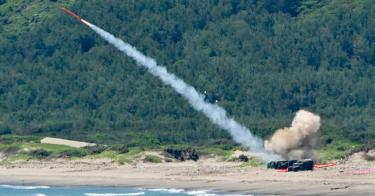In 1950, Gen. Douglas MacArthur wrote a top-secret memorandum warning of the dire consequences of allowing Taiwan to be dominated by Communist China. “The strategic interests of the United States will be in serious jeopardy,” he wrote, concluding that China’s domination of Taiwan “would be a disaster of utmost importance.”
For more than 70 years, America heeded MacArthur’s warning. For decades, standing with Taiwan has been a cornerstone of American strategy in the Indo-Pacific. Our leaders have recognized that Taiwan is a crucial barrier to the expansion of communist influence in the region. With virtual unanimity, leaders of both political parties have acknowledged that abandoning Taiwan and allowing it to fall into the hands of the Chinese Communist Party would not only betray our values but also endanger the security and prosperity of the United States and the free world.
But now, even as Chinese President Xi Jinping has candidly admitted his intention to annex Taiwan, a new and troubling strain of isolationism is emerging within the Republican Party that advocates turning our backs on Taiwan and other allies. This new isolationism, masquerading as realism, dismisses the strategic imperatives that have underpinned American foreign policy since World War II. Former president Donald Trump recently epitomized this sentiment when he remarked in an interview with Bloomberg News, “Taiwan is 9,500 miles away. It’s 68 miles away from China.” Such comments reflect a dangerously narrow understanding of America’s role in the world and ignorance of the far-reaching consequences of American disengagement.
What is distance to a global superpower? The beaches of Normandy are 3,700 miles away. Iwo Jima is 7,600 miles. It’s roughly 7,000 miles from Washington, D.C., to Afghanistan. America remains the world’s only true superpower, fully capable of projecting forces to every corner of the earth. Distance has no bearing on our responsibility to safeguard American interests.
Many commentators have noted that one of China’s goals in annexing Taiwan would be to gain a stranglehold over the global supply of semiconductors. There is also the risk of collateral damage from an invasion. Taiwan is home to more than half the world’s chip fabrication facilities, so it’s easy to envision a scenario in which much of the world’s chipmaking capability is damaged or destroyed, thrusting the global economy into a deep and painful recession, if not an outright depression. And even if chip fabrication weren’t disrupted, China could use its consolidated control over the world’s high-tech supply chain to force its will on countries throughout the region and around the world.
Most concerning of all, the fall of Taiwan would probably spark a new nuclear arms race—not just between major powers, but including smaller Asian nations concerned about Chinese aggression but no longer confident in American deterrence. If Taiwan were annexed, American security commitments would be viewed as empty promises. Many nations would feel they had no choice but to develop their own nuclear arsenals if the United States is incapable or unwilling to stop China’s predatory behavior. The end result would be hundreds, perhaps thousands, of nuclear warheads added to global stockpiles—and a much higher risk of nuclear proliferation or even nuclear war.
The stakes could not be higher. The United States must stand firm in its support for Taiwan, not because we view ourselves as a self-appointed global police force but because it is in our national interest to do so. We cannot afford to be led astray by the isolationists, who promise the illusion of peace but guarantee the reality of a more dangerous world. Instead, we must continue to lead, to honor our commitments, and to ensure that Taiwan remains free and secure.
This piece originally appeared in Washington Post





